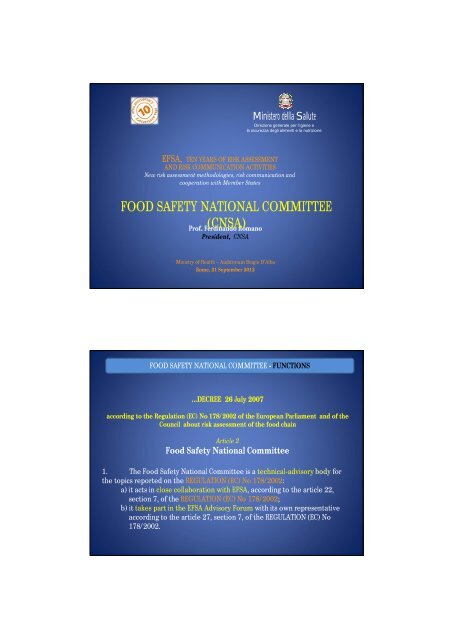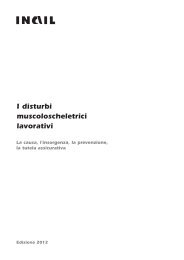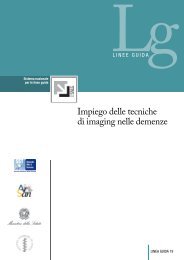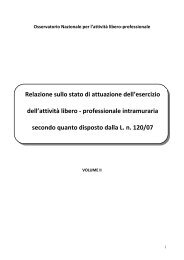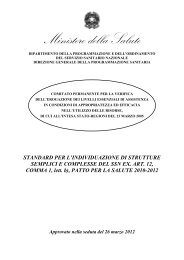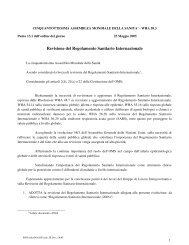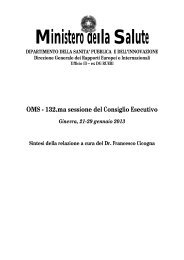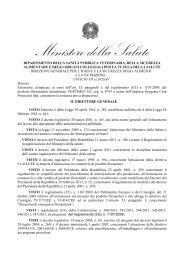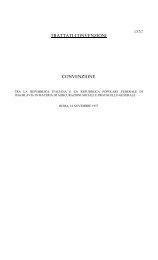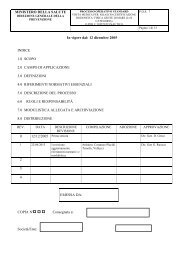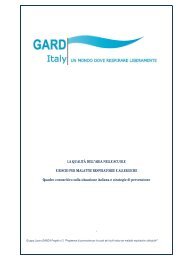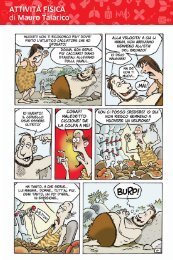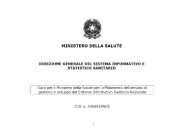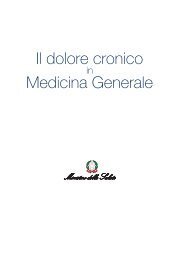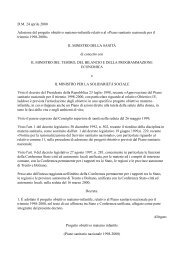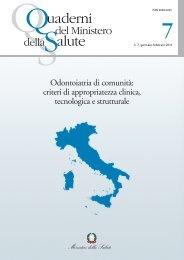food safety national committee (cnsa) - Ministero della Salute
food safety national committee (cnsa) - Ministero della Salute
food safety national committee (cnsa) - Ministero della Salute
You also want an ePaper? Increase the reach of your titles
YUMPU automatically turns print PDFs into web optimized ePapers that Google loves.
EFSA, TEN YEARS OF RISK ASSESSMENT<br />
AND RISK COMMUNICATION ACTIVITIES<br />
New risk assessment methodologies, risk communication and<br />
cooperation with Member States<br />
Prof. Ferdinando Romano<br />
President, CNSA<br />
Ministry of Health – Auditorium Biagio D’Alba<br />
Rome, 21 September 2012<br />
<strong>Ministero</strong> <strong>della</strong> <strong>Salute</strong><br />
Direzione generale per l’igiene e<br />
la sicurezza degli alimenti e la nutrizione<br />
FOOD SAFETY NATIONAL COMMITTEE<br />
(CNSA)<br />
FOOD SAFETY NATIONAL COMMITTEE - FUNCTIONS<br />
…DECREE 26 July 2007<br />
according to the Regulation (EC) No 178/2002 of the European Parliament and of the<br />
Council about risk assessment of the <strong>food</strong> chain<br />
Article 2<br />
Food Safety National Committee<br />
1. The Food Safety National Committee is a technical-advisory body for<br />
the topics reported on the REGULATION (EC) No 178/2002:<br />
a) it acts in close collaboration with EFSA, according to the article 22,<br />
section 7, of the REGULATION (EC) No 178/2002;<br />
b) it takes part in the EFSA Advisory Forum with its own representative<br />
according to the article 27, section 7, of the REGULATION (EC) No<br />
178/2002.
EFSA - MISSION<br />
REGULATION (EC) No 178/2002 OF THE EUROPEAN PARLIAMENT<br />
AND THE COUNCIL of 28 January2002<br />
laying down the general principles and requirements of <strong>food</strong> law,<br />
establishing the European Food Safety Authority and laying down procedures<br />
in matters of <strong>food</strong> <strong>safety</strong><br />
Article 22<br />
Mission of the Authority<br />
7. The Authority shall carry out its tasks in conditions which enable it to serve as a<br />
point of reference by virtue of its independence, the scientific and technical quality of<br />
the opinions it issues and the information it disseminates, the transparency<br />
of its procedures and methods of operation, and its diligence in performing the tasks<br />
assigned to it.<br />
It shall act in close cooperation with the competent bodies in the Member States<br />
carrying out similar tasks to these of the Authority<br />
…………………………..<br />
EFSA – ADVISORY FORUM<br />
REGULATION (EC) No 178/2002 OF THE EUROPEAN PARLIAMENT<br />
AND THE COUNCIL of 28 January2002<br />
laying down the general principles and requirements of <strong>food</strong> law,<br />
establishing the European Food Safety Authority and laying down procedures<br />
in matters of <strong>food</strong> <strong>safety</strong><br />
Article 27<br />
Advisory Forum<br />
1. The Advisory Forum shall be composed of representatives from competent bodies<br />
in the Member States which undertake tasks similar to those of the Authority, on the<br />
basis of one representative designated by each Member State. Representatives may<br />
be replaced by alternates, appointed at the same time.<br />
…………………………..
MINISTRY OF HEALTH - ORGANIZATION<br />
Department of Veterinary Public Health, Food Safety and Collegial Bodies for Health<br />
Protection<br />
Directorate General of Collegial Bodies for Health Protection<br />
The Directorate General of Collegial Bodies for Health Protection, identified as the<br />
competent Italian authority for the European Food Safety Authority (EFSA),<br />
performs functions related to the following:<br />
• physical, chemical and biological risk assessment in <strong>food</strong><br />
<strong>safety</strong><br />
• Supports the Food Safety National Committee activities<br />
• ensures a link with the regions also in relation to planning<br />
risk assessment activities and the operation of the Forum of<br />
consumer and producer associations<br />
……………………………………<br />
MINISTRY OF HEALTH<br />
Strategic Advisory Committee<br />
Food Safety National Committee
FOOD SAFETY NATIONAL COMMITTEE - TASKS<br />
…DECREE 26 July 2007<br />
according to the Regulation (EC) No 178/2002 of the European Parliament and of the Council about risk<br />
assessment of the <strong>food</strong> chain<br />
Article 2<br />
Food Safety National Committee<br />
…………………………..<br />
2. It provides scientific and technical support on <strong>food</strong> <strong>safety</strong> to<br />
the Administrations working on risk management in <strong>food</strong><br />
<strong>safety</strong><br />
3. It provides scientific opinions at the request of the Strategic<br />
Advisory Committee, of the Central State Administrations and of<br />
the Regions<br />
FOOD SAFETY NATIONAL COMMITTEE– COMPOSITION<br />
…DECREE 26 July 2007<br />
according to the Regulation (EC) No 178/2002 of the European Parliament and of the Council about risk<br />
assessment of the <strong>food</strong> chain<br />
Article 2<br />
Food Safety National Committee<br />
…………………………..<br />
4. … is composed of 18 members with specific expertise in the following topics:<br />
a) <strong>food</strong> additives, flavourings, processing aids and materials in contact with <strong>food</strong>;<br />
b) additives and products or substances used in animal feed;<br />
c) plant health, plant protection products and their residues;<br />
d) genetically modified organisms;<br />
e) dietetic products, nutrition and allergies;<br />
f) biological hazards;<br />
g) contaminants in the <strong>food</strong> chain;<br />
h) animal health and welfare.
FOOD SAFETY NATIONAL COMMITTEE – COMPOSITION<br />
…DECREE 26 July 2007<br />
Organization of the functions according to the Regulation (EC) No 178/2002 of the European Parliament and<br />
of the Council about risk assessment of the <strong>food</strong> chain<br />
Article 2<br />
Food Safety National Committee<br />
…………………………..<br />
8. The Committee may appoint further independent<br />
scientific experts on specific issues under evaluation, through<br />
setting ad hoc workgroups.<br />
FOOD SAFETY NATIONAL COMMITTEE – CONFLICT OF INTEREST<br />
…DECREE 26 July 2007<br />
Organization of the functions according to the Regulation (EC) No 178/2002 of the European Parliament and<br />
of the Council about risk assessment of the <strong>food</strong> chain<br />
Article 2<br />
Food Safety National Committee<br />
…………………………..<br />
9. For the members of the Committee it is mandatory to deliver<br />
scientific advice in the public interest independently of any<br />
external influence.<br />
For this purpose, they have to declare any conflicts of interest<br />
that may be considered prejudicial to their independence.
STRATEGIC ADVISORY COMMITTEE - TASKS<br />
…DECREE 26 July 2007<br />
Organization of the functions according to the Regulation (EC) No 178/2002 of the European Parliament and<br />
of the Council about risk assessment of the <strong>food</strong> chain<br />
Article 3<br />
Strategic Advisory Committee<br />
……………………..<br />
1. The Strategic Advisory Committee performes the following tasks within the risk<br />
assessment of the <strong>food</strong> chain:<br />
a) it defines the programme of activities on a pluriannual basis;<br />
b) it defines the priorities for the actions<br />
c) It defines the communication policy<br />
2. In order to comply with the above, the Committee takes into account also the<br />
problems rised by the Forum of the Consumers and Producers Associations<br />
STRATEGIC ADVISORY COMMITTEE – COMPOSITION<br />
…DECREE 26 July 2007<br />
Organization of the functions according to the Regulation (EC) No 178/2002 of the European Parliament and<br />
of the Council about risk assessment of the <strong>food</strong> chain<br />
Article 3<br />
Strategic Advisory Committee<br />
……………………..<br />
1. … is composed of:<br />
a) the Minister of Health, or her/his delegate, as President<br />
b) the Minister of Agricolture, Food and Forestry Policies or her/his delegate<br />
c) the Coordinator of the Regional Assessors responsible for Health<br />
d) the Coordinator of the Regional Assessors responsible for Agricolture<br />
e) the Head of the Department of Veterinary Public Health, Food Safety and Collegial Bodies for Health,<br />
Ministry of Health<br />
f) the Head of the Department of Development Policies, Ministry of Agricolture, Food and Forestry Policies<br />
g) the Director of the National Secretariat for Risk Assessment of the Food Chain<br />
h) three technical representatives of the Regions, appointed by the Assembly of the Regions<br />
i) the President of the National Health Institute<br />
j) the President of the National Institute for Research on Food and Nutrition<br />
k) the President of the Food Safety National Committee<br />
l) one member of the Food Safety National Committee, appointed by by the Minister of Health and the<br />
Minister of Agricolture, Food and Forestry Policies<br />
m) one representative of the Experimental Zooprophylactic Institutes, appointed by the Minister of Health.
FOOD SAFETY NATIONAL COMMITTEE – MEMBERS<br />
PROF. FERDINANDO ROMANO<br />
Dr. LEONELLO ATTIAS<br />
Prof. LUCIANA AVIGLIANO<br />
Prof. BARTOLOMEO BIOLATTI<br />
Prof. GAETANO CREPALDI<br />
Prof. MARIA LUISA CORTESI<br />
Dr. AMLETO D’AMICIS<br />
Prof ADRIANA IANIERI<br />
Dr. ALBERTO MANTOVANI<br />
Start on 15 September 2011<br />
Prof. AUGUSTO PANA’<br />
Prof. GIAMPAOLO PECCOLO<br />
Prof. GIANFRANCO PIVA<br />
Prof. GIORGIO POLI<br />
Dr. ANTONIA RICCI<br />
Prof. GIORGIO RONDINI<br />
Prof. GIUSEPPE ROTILIO<br />
Prof. MARCELLO TICCA<br />
Prof. GIAN VINCENZO ZUCCOTTI<br />
(independent scientific experts)<br />
COMITATO NAZIONALE SICUREZZA ALIMENTARE – INTERNAL REGULATION<br />
Internal Regulation<br />
Article 7<br />
(Procedures for the release of Scientific Opinions)<br />
�define the question<br />
�study objectives<br />
�information sources<br />
�available data description<br />
�evaluation of data quality<br />
�selection of the eligible data<br />
�data analysis<br />
�Interpretation of the results<br />
�Scientific opinion<br />
Methodology
FOOD SAFETY NATIONAL COMMITTEE – DOCUMENTS<br />
� Scientific opinion on Energy drinks<br />
� Scientific opinion on Food allergies and consumer<br />
<strong>safety</strong><br />
� Scientific opinion on Transmissible spongiform<br />
encephalopathies (TSEs) in sheep and goats<br />
� Scientific opinion on Modernization of swine meat<br />
inspection<br />
FOOD SAFETY NATIONAL COMMITTEE – ENERGY DRINKS<br />
Energy drinks – issues related to <strong>safety</strong> and accurate<br />
information to consumers<br />
“Considerando la mole dei dati disponibili e i limiti dell’attuale<br />
legislazione, è necessario intervenire, in particolar modo<br />
rivolgendosi in maniera diretta, comprensibile e specifica al<br />
giovane consumatore. E’ pertanto fondamentale poter garantire<br />
l’ampia diffusione e l’accesso ad informazioni dettagliate e<br />
chiare relativamente all’esistenza, alla tipologia e alla potenziale<br />
severità degli effetti negativi del consumo associato di EDs ed<br />
alcol. E’ inoltre necessario contrastare, con opportuni strumenti<br />
normativi, l’eventuale diffusione anche in Italia di EDs alcolici<br />
acquistabili anche online, in particolare nelle fasce di popolazione<br />
più deboli, come nel caso degli adolescenti.”
FOOD SAFETY NATIONAL COMMITTEE – TSE<br />
� Risk of exposure to PrPSC in the case of adopting derogations from Reg.<br />
(CE) 727/2007<br />
� Risk of disease related to consumption of sheep and goat meat coming<br />
from farms with cases of TSE<br />
…RITIENE<br />
che, in applicazione delle deroghe previste dal regolamento CE<br />
727/2007, il rischio di esposizione del consumatore a seguito<br />
dell’assunzione di carni provenienti da animali sensibili alla malattia<br />
o da focolai di encefalopatia spongiforme trasmissibile (EST ) possa<br />
definirsi accettabile; in mancanza di evidenza scientifica che<br />
dimostri la trasmissione di EST all’uomo il rischio di contrarre la<br />
malattia è da considerarsi trascurabile e quindi accettabile;<br />
AUSPICA<br />
un incremento dei piani di selezione genetica di animali resistenti già<br />
previsti dall’attuale normativa;<br />
FOOD SAFETY NATIONAL COMMITTEE – MEAT INSPECTION<br />
Modernization of swine meat inspection<br />
(EFSA Scientific Opinion on the public health hazards to be covered by inspection of<br />
meat (swine) n. 2351 adopted on 31 August 2011<br />
…RITIENE<br />
che allo stato attuale, in considerazione delle diverse tipologie di allevamento e<br />
macellazione del suino in Italia e <strong>della</strong> difficoltà di estrapolazione ed aggregazione dei<br />
dati raccolti dall’attuale sistema e relativi esiti dell’ispezione ante e post-mortem, non<br />
risulti possibile escludere che l’eventuale modifica <strong>della</strong> normativa comunitaria<br />
sull’ispezione delle carni suine aumenti i rischi per il consumatore;<br />
AUSPICA<br />
la realizzazione di progetti pilota da parte <strong>della</strong> Direzione generale per l’igiene, la<br />
sicurezza alimentare e la nutrizione e <strong>della</strong> Direzione generale <strong>della</strong> sanità animale e dei<br />
farmaci veterinari, volti ad acquisire, relativamente ai due modelli produttivi, i dati<br />
necessari per motivare ed orientare la posizione dell’Italia;
THANK YOU FOR YOUR<br />
ATTENTION …


